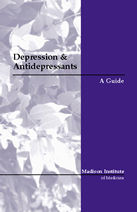
| Table of Contents | |
| Excerpt 1 | |
| Excerpt 2 | |
| Testimonials | |
| Authors James W. Jefferson, MD, John H. Greist, MD and Dilek Tunali, MD |
|
Depression & Antidepressants: A Guide (Excerpt 2) How is depression treated? There are a number of approaches to treating depression. The choice of treatment depends on factors such as the presumed cause of the depression, the availability of various treatments, and the patient�s and clinician�s preferences. Often, physicians use medications to treat depression. There are many antidepressant drugs available that effectively improve mood and alleviate other symptoms of depression. At present, antidepressant medications are the cornerstones of treating depression, especially depressions that are at least moderately severe. Psychotherapy, or "talk" therapy, is another commonly used treatment. Three kinds of psychotherapy have been shown to be specifically effective for treating mild to moderate depression (see pages 39-40). Cognitive therapy (also referred to as cognitive-behavioral therapy) is directed at correcting distorted cognitions or thoughts that are felt to be responsible for causing depression. Interpersonal psychotherapy is a focused, time-limited treatment that deals with improving relationships with others and self-esteem. Behavior therapy by itself is helpful to many patients whose behaviors change as they become depressed. Increasing the number of normal and nondepressed behaviors results in positive reinforcement that leads to still more positive experiences, thereby lessening depression. Often psychotherapy is combined with medication to provide the most comprehensive treatment. Transcranial magnetic stimulation (TMS) and vagus nerve stimulation (VNS) are treatments that have been cleared by the U.S. Food and Drug Administration (FDA) for use in treatment-resistant depression. Deep brain stimulation (DBS) is currently an investigational procedure (see page 42). Electroconvulsive therapy (ECT) may be used for more severe depression, especially if other treatments have failed (see page 41). It is particularly helpful if suicide risk is high or if a patient is psychotically depressed (has lost touch with reality). Exercise, light therapy and sleep deprivation (see page 43) are experimental treatments that show promise and may be tried when conventional treatments do not succeed. In extreme situations of severe, treatment-resistant depression, and only with the fully informed consent of the depressed person, specific neurosurgical procedures may be beneficial.
|